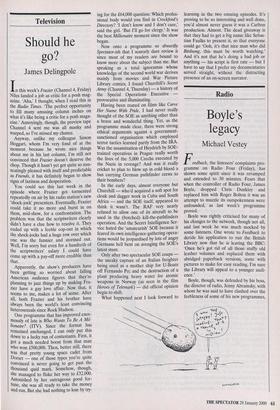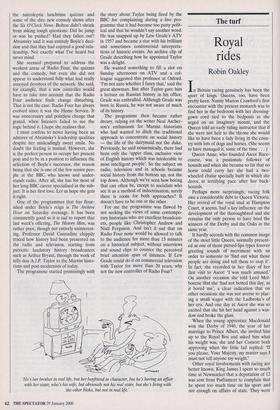Radio
Boyle's legacy
Michael Vestey
Feedback, the listeners' complaints pro- gramme on Radio Four (Friday), has shown some spirit since it was revamped and extended to 30 minutes. Fears that when the controller of Radio Four, James Boyle, dropped Chris Dunldey and replaced him with Roger Bolton it was an attempt to muzzle its outspokenness were unfounded, as last week's programme proved.
Boyle was rightly criticised for many of his changes to the network, though not all, and last week he was much mocked by some listeners. One wrote to Feedback to deride his application to run the British Library now that he is leaving the BBC: 'Once he's got rid of all those stuffy old leather volumes and replaced them with abridged paperback versions, some with pictures to make for easy reading, I'm sure the Library will appeal to a younger audi- ence.'
Boyle, though, was defended by his boss, the director of radio, Jenny Abramsky, with whom he was said to have clashed over the feebleness of some of his new programmes, the narcoleptic lunchtime quizzes and some of the dire new comedy shows after the Six O'Clock News. Bolton didn't shrink from asking tough questions: Did he jump or was he pushed? Had they fallen out? Abramsky said it was entirely Boyle's deci- sion and that they had enjoyed a good rela- tionship. Not exactly what I've heard but never mind.
She seemed prepared to address the weakest areas of Radio Four, the quizzes and the comedy, but even she did not appear to understand fully what had really annoyed devotees of the network. She said, for example, that a new controller would have to take into account that the Radio Four audience finds change disturbing. That is not the case. Radio Four has always evolved since it was the Home Service. It was unnecessary and pointless change that grated, when listeners failed to see the logic behind it. I hope she realises that.
I must confess to never having been an admirer of Abramsky's leadership qualities despite her misleadingly sweet smile. No doubt the feeling is mutual. However, she is the perfect person to occupy her present post and to be in a position to influence the selection of Boyle's successor, the reason being that she is one of the few senior peo- ple at the BBC who knows and under- stands radio. After all, she has for most of her long BBC career specialised in the sub- ject. It is her first love. Let us hope she gets it right.
One of the programmes that has flour- ished under Boyle's reign is The Archive Hour on Saturday evenings. It has been consistently good so it is sad to report that last week's offering, The History Men, was rather poor, though not entirely uninterest- ing. Professor David Cannadine chippily traced how history had been presented on the radio and television, starting from patriotic laudatory history broadcasters such as Arthur Bryant, through the work of telly don A.J.P. Taylor to the Marxist histo- rians and post-modernists of today.
The programme started promisingly with the story about Taylor being fired by the BBC for complaining during a live pro- gramme that it had become too party polit- ical and that he wouldn't say another word. He was snapped up by Lew Grade's ATV in 1957 and became a star with his brilliant and sometimes controversial interpreta- tions of historic events. An archive clip of Grade describing how he appointed Taylor was a delight.
He wanted something to fill a slot on Sunday afternoons on ATV and a col- league suggested this professor at Oxford. 'I'm not sure whether I fancy that,' said the great showman. But after Taylor gave him a lecture on Russian history in his office, Grade was enthralled. Although Grade was born in Russia, he was not aware of much of its history.
The programme then became rather dreary, retying on the writer Neal Ascher- son's enthusiasm for Marxist historians who had wanted to ditch the traditional approach to concentrate on social history — the life of the dairymaid not the duke. Previously, he said nonsensically, there had been only the 'upper class, exclusive view of English history which was intolerable to most intelligent people'. So the subject on radio, television and in schools became social history from the bottom up, not the top down. Although we've seen how boring that can often be, except to socialists who see it as a method of indoctrination, surely there is room for both approaches? It doesn't have to be one or the other.
For me the programme was flawed by not seeking the views of some contempo- rary historians who are excellent broadcast- ers, people like Christopher Andrew and Niall Ferguson. And isn't it sad that on Radio Four none would be allowed to talk to the audience for more than 15 minutes on a historical subject, without interviews and sound clips to counter the perceived brief attention span of listeners. If Lew Grade could do it on commercial television with Taylor for more than 20 years, why not the new controller of Radio Four?
'He's her brother in real life, but her boyfriend in character, but he's having an affair with her sister, who's his wife, but obviously not his real sister, but she's living with the other bloke, but not in real life.'



















































































 Previous page
Previous page